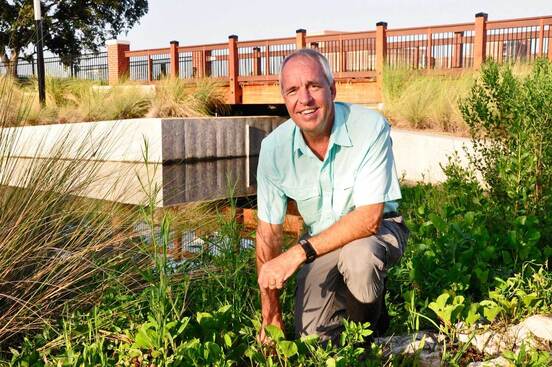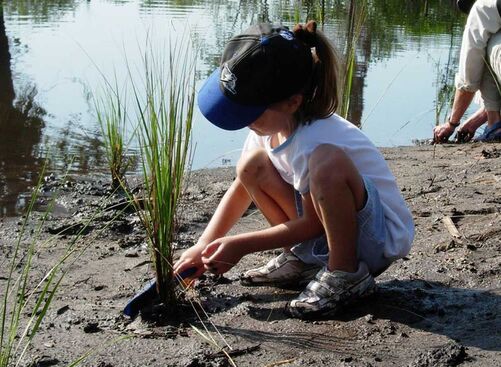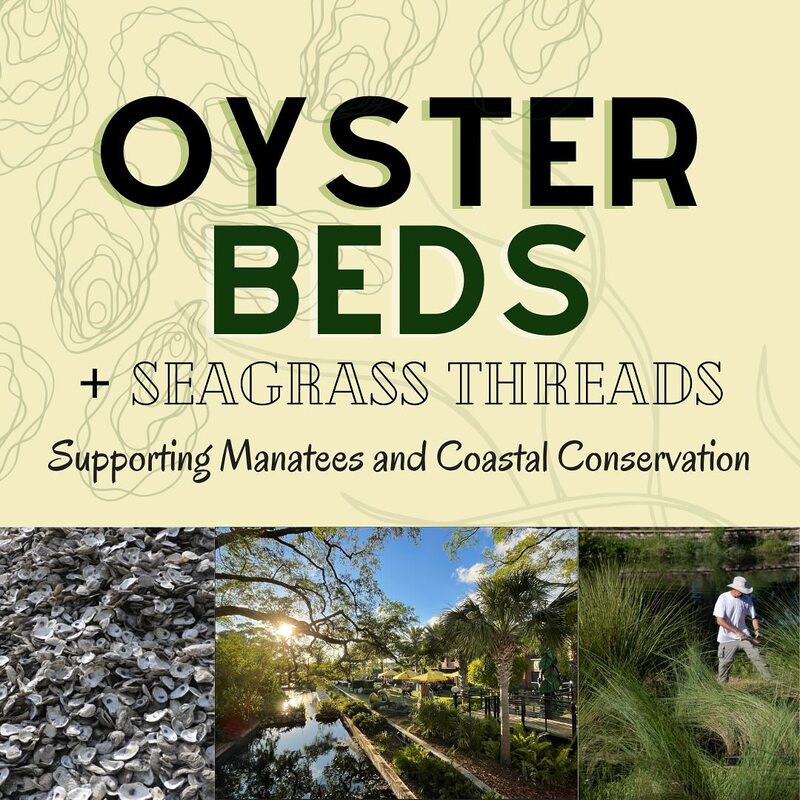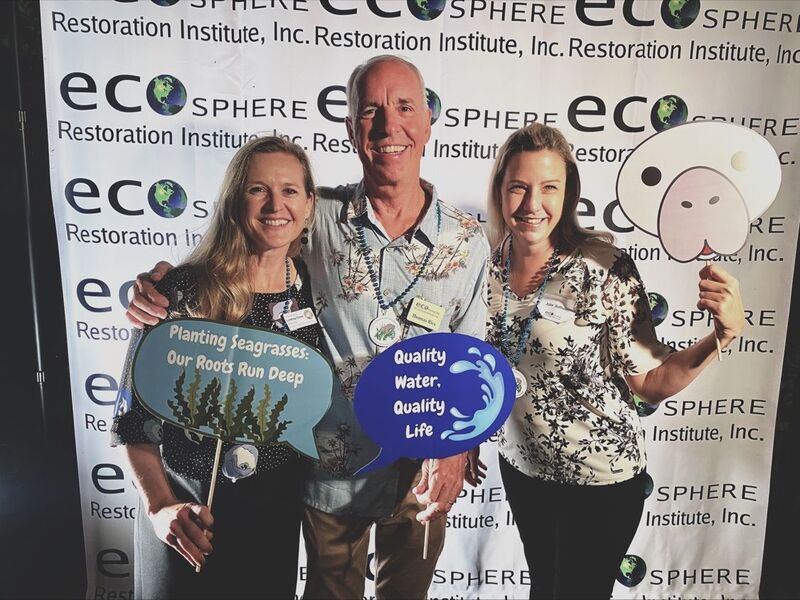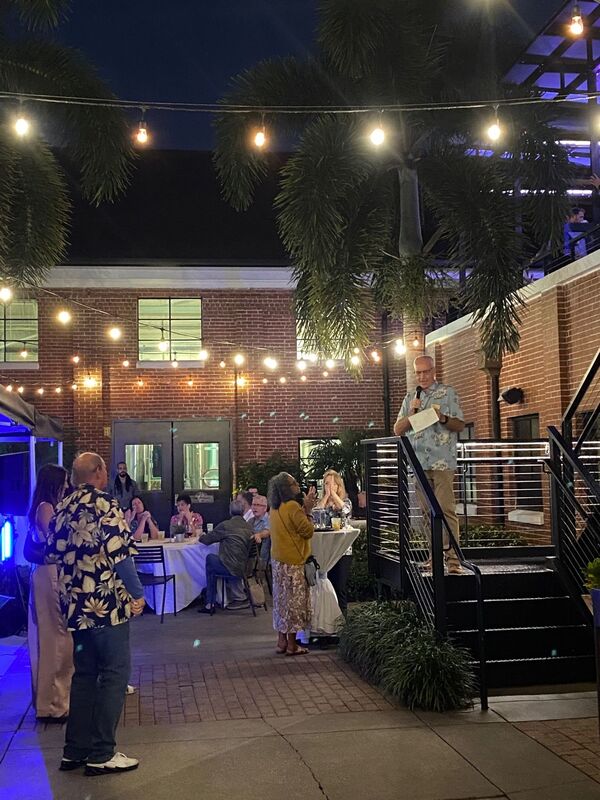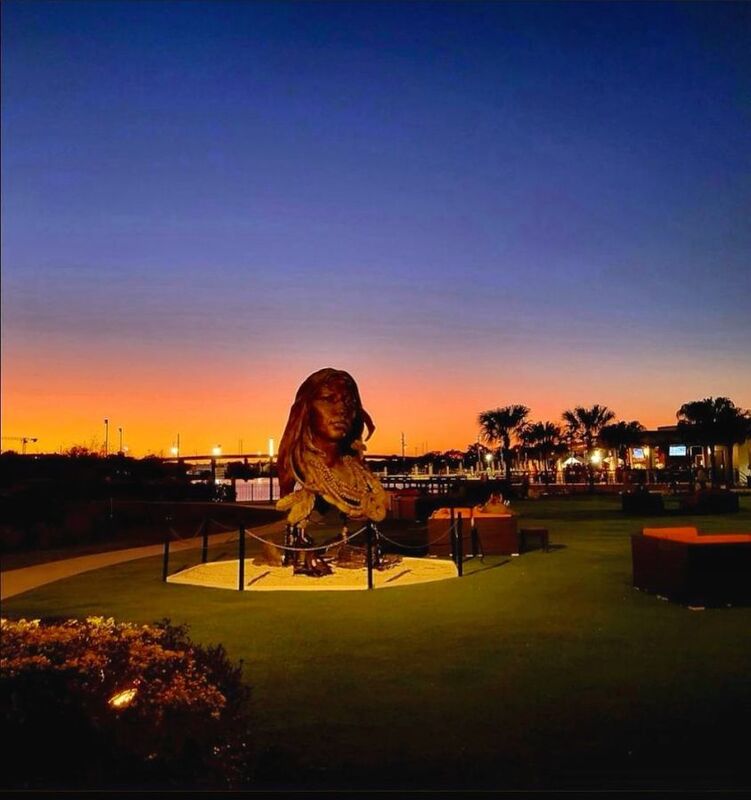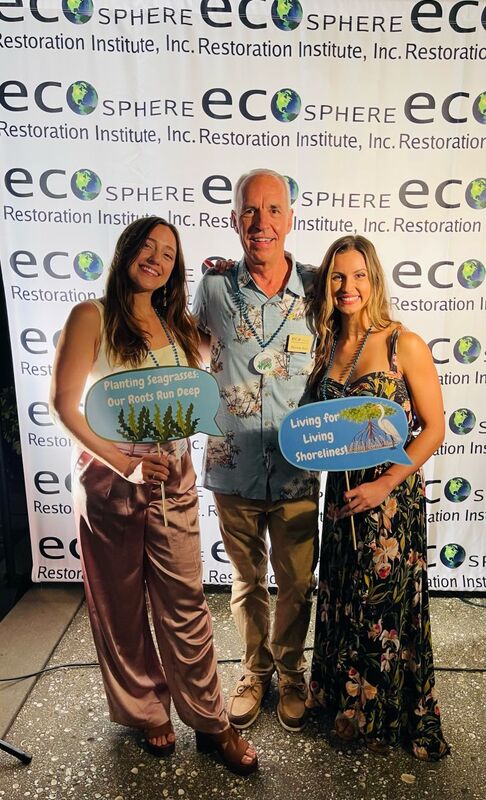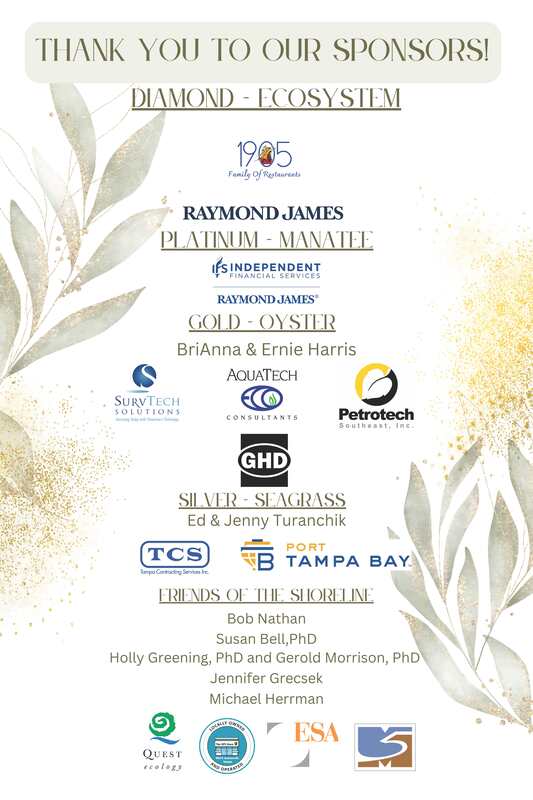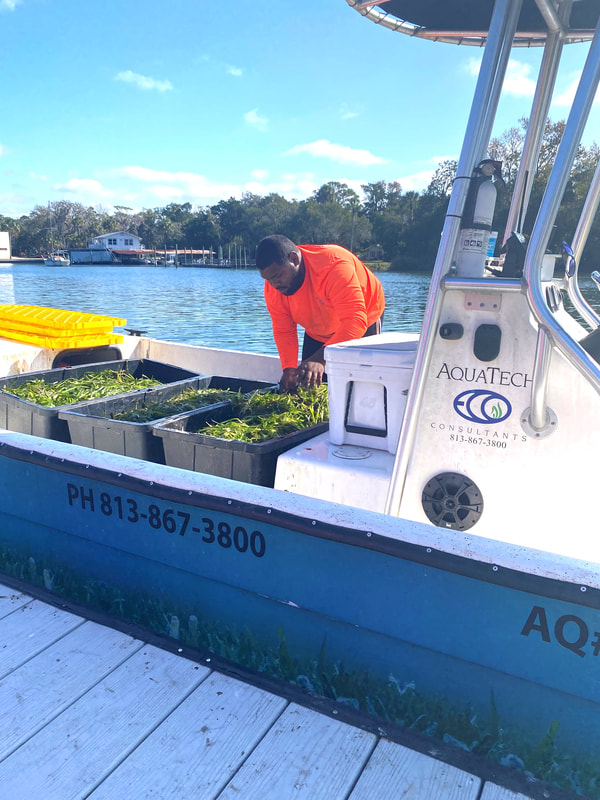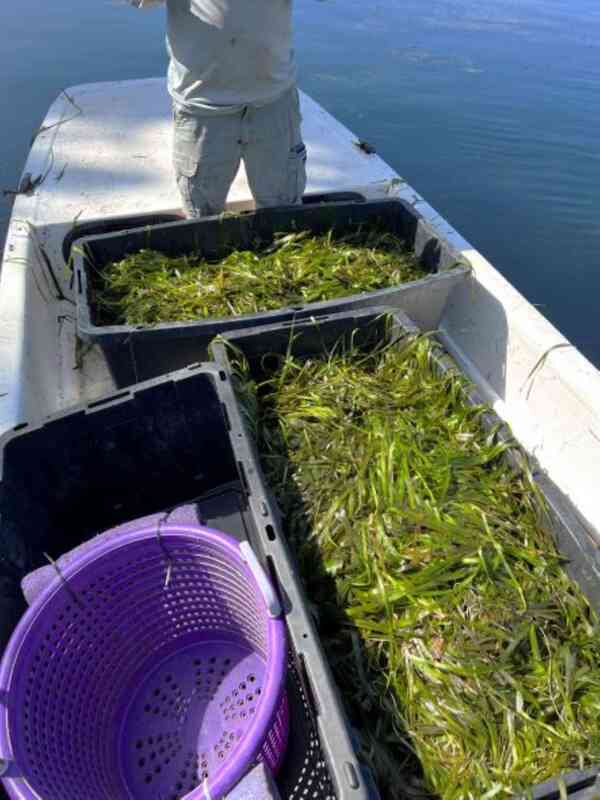Conservation. Collaboration. Community.
Ecosphere Restoration Institute is a non-profit organization with deep roots in the Tampa Bay region and an outstanding track record of success in cutting-edge conservation techniques.
Created in 2007 to foster public and private partnerships for environmental restoration, we have facilitated 25 projects that have restored more than 350 acres of critical habitats and enhanced over 2,200 acres in Hillsborough County alone. In addition, we have fostered a dozen living shoreline projects restoring over 3 miles of eroded coastlines. Our expertise in building innovative partnerships has secured $10 million in grants and $11 million in matching funds involving participants ranging from federal agencies, regional/local governments, and large industries to small businesses, community groups and citizen-volunteers.
See our at-a-glance map of completed and current projects.
Our streamlined operational structure allows us to emphasize direct, in-ground restoration to benefit fish, wildlife and people, by:
Created in 2007 to foster public and private partnerships for environmental restoration, we have facilitated 25 projects that have restored more than 350 acres of critical habitats and enhanced over 2,200 acres in Hillsborough County alone. In addition, we have fostered a dozen living shoreline projects restoring over 3 miles of eroded coastlines. Our expertise in building innovative partnerships has secured $10 million in grants and $11 million in matching funds involving participants ranging from federal agencies, regional/local governments, and large industries to small businesses, community groups and citizen-volunteers.
See our at-a-glance map of completed and current projects.
Our streamlined operational structure allows us to emphasize direct, in-ground restoration to benefit fish, wildlife and people, by:
- Creating or enhancing habitat for manatees, waterfowl, wading birds and economically important fish and shellfish.
- Restoring wetlands that improve water quality and absorb storm surges, reducing property damage and mitigating the long-term effects of rising seas.
- Building innovative “living shorelines” that employ natural, organic materials such as native plants and oyster reefs instead of hardened seawalls to reduce erosion while providing habitat for marine life.
- Providing outdoor recreational opportunities for the 2.6 million residents of the Tampa Bay watershed through paddling trails, boardwalks, observation towers and hiking trails.
- Employing 86 local companies and contractors, from engineering and survey firms to heavy equipment operators to archaeologists and wildlife biologists.
|
|
|
Who We AreSmall but mighty. That's how we like to describe ourselves. Our non-profit status and dedicated team allow us to operate with low overhead, spending grant funds and local contributions where they matter most -- on restoring our natural legacy for future generations. Our streamlined approach works. Ecosphere projects have received numerous regional and local awards for environmental excellence, and securing millions of dollars in grant to leverage local funds. In 2013, Ecosphere founder and President Tom Ries was honored with a National Wetlands Award from the National Environmental Law Institute in Washington, DC. Learn more about our team |
What We DoWe know that the best natural areas in the Tampa Bay watershed are not always in public ownership, and that governments and non-profits can't buy all the land they would like to preserve. That's where we come in, working collaboratively with both private and public partners to restore land that might not otherwise be protected. From small "frog ponds" used by amphibians and wading birds, to curvy creeks flanked by statuesque sabal palms, we focus on work that benefits the fish, wildlife and people of Tampa Bay. We're especially proud of our contribution to the local economy through our commitment to hiring local businesses at every stage of our restoration projects. Take a closer look at what we do |
Our First FUN-Raiser at Ulele Tampa Was A Success
Thanks to our sponsors and the more than 100 supporters who attended our inaugural "Oyster Beds and Seagrass Threads" benefit at Ulele on November 17! Your contribution will support our ongoing manatee and coastal conservation initiatives.
Attendees enjoyed delicious nom-noms from Ulele, including fire-grilled oysters (of course) and walking tours of the Ulele Soring Restoration, one of Ecosphere's signature achievements.
Attendees enjoyed delicious nom-noms from Ulele, including fire-grilled oysters (of course) and walking tours of the Ulele Soring Restoration, one of Ecosphere's signature achievements.
NEW! Ecosphere Receives $5 Million for Seagrass Restoration
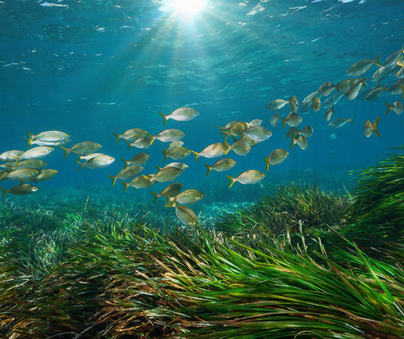
Ecosphere Restoration Institute is leading a $5 million effort to replant coastal seagrasses in key Florida waterways to enhance overall water quality and provide a critical source of food for imperiled manatees.
Planting will focus on areas where submerged aquatic vegetation, such as seagrass have been essentially lost, such as the Indian River Lagoon, or areas severely impacted by red tides or other harmful algae blooms, such as Sarasota and Tampa Bays. The funding, approved in July 2022 by the Florida Legislature, will facilitate a network of aquaculture nurseries to grow and plant regionally specific seagrasses where they are most critically needed. The goal is to jump-start seagrass recovery so that natural recolonization can occur.
Seagrasses are among the world’s most valuable habitats, supporting a multitude of creatures from shrimp and stingrays to sea trout, sea turtles and Florida’s famed sea cows, manatees. Seagrasses also anchor aquatic sediments in place, and absorb and store carbon that otherwise would be released to the atmosphere. A single acre of seagrass may support as many as 40,000 individual fish and 50 million small invertebrates. Globally, seagrasses are 30 times more efficient at storing carbon than tropical rainforests.
Planting will focus on areas where submerged aquatic vegetation, such as seagrass have been essentially lost, such as the Indian River Lagoon, or areas severely impacted by red tides or other harmful algae blooms, such as Sarasota and Tampa Bays. The funding, approved in July 2022 by the Florida Legislature, will facilitate a network of aquaculture nurseries to grow and plant regionally specific seagrasses where they are most critically needed. The goal is to jump-start seagrass recovery so that natural recolonization can occur.
Seagrasses are among the world’s most valuable habitats, supporting a multitude of creatures from shrimp and stingrays to sea trout, sea turtles and Florida’s famed sea cows, manatees. Seagrasses also anchor aquatic sediments in place, and absorb and store carbon that otherwise would be released to the atmosphere. A single acre of seagrass may support as many as 40,000 individual fish and 50 million small invertebrates. Globally, seagrasses are 30 times more efficient at storing carbon than tropical rainforests.
It is imperative that we act now to stop Florida’s spiraling seagrasses losses, and Ecosphere is ideally suited for this effort because of our long and successful track record in restoring coastal habitats,” said Tom Ries, president of Ecosphere Restoration Institute.
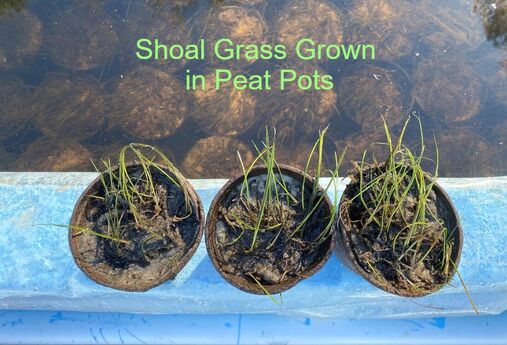
Initial plantings will occur in several locations in Tampa Bay, a designated priority for restoration under the statewide Surface Water Improvement and Management (SWIM) program. Following that, suitable locations in Sarasota Bay will be identified. Project managers hope to plant 100 acres of seagrass within two years in waterways from the Florida Panhandle to the Florida Keys, with a special focus on the Indian River Lagoon.
Both bare-root plants and seagrass “plugs” in small, biodegradable peat pots will be used. For the Indian River Lagoon, a variety of techniques will be employed to protect the young seagrasses until they are rooted, including:
Once rooted, enclosures will be removed and the grasses available for grazing by manatees. Currently the complete loss of seagrasses in the Indian River Lagoon has forced state biologists to provide supplemental food for manatees there. Additionally, surveys show continued declines in seagrasses in many Florida bays and estuaries because of algae blooms and excess nutrient pollution.
The seagrasses will be grown and then transplanted by AquaTech Eco Consultants and Aquaticus Plants, with monitoring of plant survival and subsequent predation by manatees or other aquatic animals conducted by the University of South Florida. Monitoring also will evaluate the success of different installation and protection methods for the seagrasses.
Ecosphere would like to thank former state Sen. Manny Diaz and Rep. Alex Andrade for their sponsorship of the bill authorizing the seagrass planting initiative. The project will be administered by the Florida Department of Environmental Protection.
Both bare-root plants and seagrass “plugs” in small, biodegradable peat pots will be used. For the Indian River Lagoon, a variety of techniques will be employed to protect the young seagrasses until they are rooted, including:
- planting multiple small patches within former seagrass beds to “hide” the new sprigs; and,
- temporarily enclosing some newly planted sites in fences or within domed cages.
Once rooted, enclosures will be removed and the grasses available for grazing by manatees. Currently the complete loss of seagrasses in the Indian River Lagoon has forced state biologists to provide supplemental food for manatees there. Additionally, surveys show continued declines in seagrasses in many Florida bays and estuaries because of algae blooms and excess nutrient pollution.
The seagrasses will be grown and then transplanted by AquaTech Eco Consultants and Aquaticus Plants, with monitoring of plant survival and subsequent predation by manatees or other aquatic animals conducted by the University of South Florida. Monitoring also will evaluate the success of different installation and protection methods for the seagrasses.
Ecosphere would like to thank former state Sen. Manny Diaz and Rep. Alex Andrade for their sponsorship of the bill authorizing the seagrass planting initiative. The project will be administered by the Florida Department of Environmental Protection.
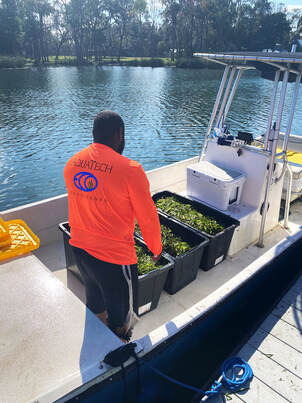
NEW! Unique Partnership Helping to Feed Florida Manatees
Ecosphere Restoration Institute is spearheading an innovative partnership to harvest and deliver eelgrass to rehabilitation centers caring for famished manatees rescued from Florida waters where their natural food sources have disappeared.
From December 2021 through June 2022, the effort distributed 4.8 tons of eelgrass – a natural and preferred food for manatees – to five facilities housing malnourished manatees. The facilities are Zoo Tampa, the Jacksonville Zoo, Sea World, Ellie Schiller Homosassa Springs Wildlife Park and the South Florida Museum’s Parker Manatee Aquarium.
Most of the rescued manatees came from the Indian River Lagoon, where free-falling seagrass losses continue to take a severe toll on Florida’s iconic marine mammal. A record 1,100 manatees died in 2021 in Florida, with 30% of those in the Indian River Lagoon. Another 800 manatees died statewide in 2023, according to state wildlife biologists.
Ecosphere was approached in late 2021 by Soldiers for Animals, a non-profit organization that engages military veterans in wildlife conservation programs. The group wanted to do something to help Florida’s starving manatees. They agreed to provide $1,000 a week for 12 weeks starting in January 2022 to provide fresh eelgrass to the six manatee rehab sites throughout the state. The harvesting and delivery of eelgrass is ongoing through 2023 with the help of AquaTech Eco Consultants. Floating eelgrasses are collected from canals in Crystal River and delivered directly to manatee rehab centers.
“It’s really a win-win because the grasses we’re taking are clogging up canals, just floating on the surface. The homeowners who live on the canals are happy to get rid of the grass, and the rehab centers are happy to get a natural food that manatees prefer over lettuce,” said Tom Ries, Ecosphere’s President.
The Florida Fish and Wildlife Conservation Commission, the lead agency overseeing manatee protection, approved the eelgrass delivery project.
If you would like to contribute to extend this program; donations are welcome, feel free to contact us to learn more.
Ecosphere Restoration Institute is spearheading an innovative partnership to harvest and deliver eelgrass to rehabilitation centers caring for famished manatees rescued from Florida waters where their natural food sources have disappeared.
From December 2021 through June 2022, the effort distributed 4.8 tons of eelgrass – a natural and preferred food for manatees – to five facilities housing malnourished manatees. The facilities are Zoo Tampa, the Jacksonville Zoo, Sea World, Ellie Schiller Homosassa Springs Wildlife Park and the South Florida Museum’s Parker Manatee Aquarium.
Most of the rescued manatees came from the Indian River Lagoon, where free-falling seagrass losses continue to take a severe toll on Florida’s iconic marine mammal. A record 1,100 manatees died in 2021 in Florida, with 30% of those in the Indian River Lagoon. Another 800 manatees died statewide in 2023, according to state wildlife biologists.
Ecosphere was approached in late 2021 by Soldiers for Animals, a non-profit organization that engages military veterans in wildlife conservation programs. The group wanted to do something to help Florida’s starving manatees. They agreed to provide $1,000 a week for 12 weeks starting in January 2022 to provide fresh eelgrass to the six manatee rehab sites throughout the state. The harvesting and delivery of eelgrass is ongoing through 2023 with the help of AquaTech Eco Consultants. Floating eelgrasses are collected from canals in Crystal River and delivered directly to manatee rehab centers.
“It’s really a win-win because the grasses we’re taking are clogging up canals, just floating on the surface. The homeowners who live on the canals are happy to get rid of the grass, and the rehab centers are happy to get a natural food that manatees prefer over lettuce,” said Tom Ries, Ecosphere’s President.
The Florida Fish and Wildlife Conservation Commission, the lead agency overseeing manatee protection, approved the eelgrass delivery project.
If you would like to contribute to extend this program; donations are welcome, feel free to contact us to learn more.
NEW! ERI Founder Tom Ries talks about partnering with the Tampa Bay Estuary Program to advance community-based habitat restoration in this short video produced for TBEP by filmmaker G. Steve Jordan.
©2018 Ecosphere Restoration Institute. All rights reserved.
